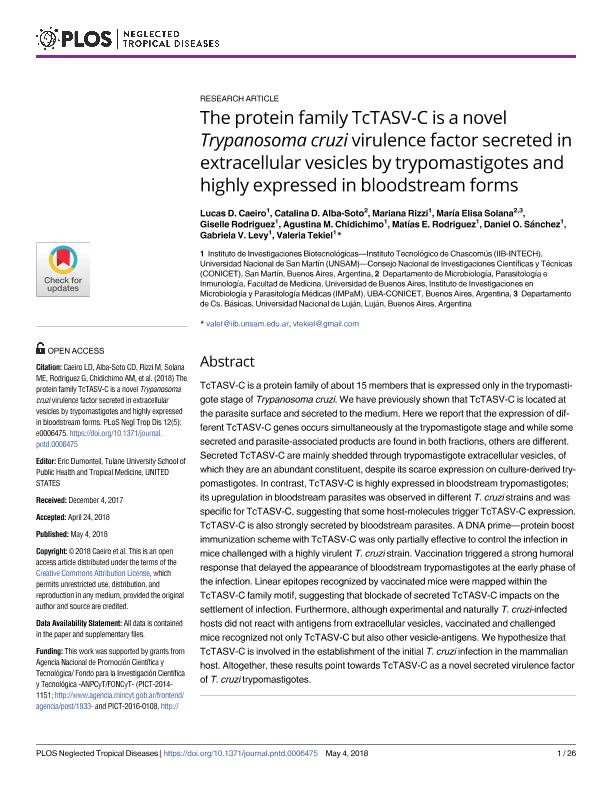Artículo
The protein family TcTASV-C is a novel Trypanosoma cruzi virulence factor secreted in extracellular vesicles by trypomastigotes and highly expressed in bloodstream forms
Caeiro, Lucas Daniel ; Alba Soto, Catalina Dirney
; Alba Soto, Catalina Dirney ; Rizzi, Mariana
; Rizzi, Mariana ; Solana, Maria Elisa; Rodriguez, Giselle; Chidichimo, Agustina María; Rodriguez, Matias Exequiel
; Solana, Maria Elisa; Rodriguez, Giselle; Chidichimo, Agustina María; Rodriguez, Matias Exequiel ; Sanchez, Daniel Oscar
; Sanchez, Daniel Oscar ; Levy, Gabriela Vanesa
; Levy, Gabriela Vanesa ; Tekiel, Valeria Sonia
; Tekiel, Valeria Sonia
 ; Alba Soto, Catalina Dirney
; Alba Soto, Catalina Dirney ; Rizzi, Mariana
; Rizzi, Mariana ; Solana, Maria Elisa; Rodriguez, Giselle; Chidichimo, Agustina María; Rodriguez, Matias Exequiel
; Solana, Maria Elisa; Rodriguez, Giselle; Chidichimo, Agustina María; Rodriguez, Matias Exequiel ; Sanchez, Daniel Oscar
; Sanchez, Daniel Oscar ; Levy, Gabriela Vanesa
; Levy, Gabriela Vanesa ; Tekiel, Valeria Sonia
; Tekiel, Valeria Sonia
Fecha de publicación:
05/2018
Editorial:
Public Library of Science
Revista:
Neglected Tropical Diseases
ISSN:
1935-2735
Idioma:
Inglés
Tipo de recurso:
Artículo publicado
Clasificación temática:
Resumen
TcTASV-C is a protein family of about 15 members that is expressed only in the trypomastigote stage of Trypanosoma cruzi. We have previously shown that TcTASV-C is located at the parasite surface and secreted to the medium. Here we report that the expression of different TcTASV-C genes occurs simultaneously at the trypomastigote stage and while some secreted and parasite-associated products are found in both fractions, others are different. Secreted TcTASV-C are mainly shedded through trypomastigote extracellular vesicles, of which they are an abundant constituent, despite its scarce expression on culture-derived trypomastigotes. In contrast, TcTASV-C is highly expressed in bloodstream trypomastigotes; its upregulation in bloodstream parasites was observed in different T. cruzi strains and was specific for TcTASV-C, suggesting that some host-molecules trigger TcTASV-C expression. TcTASV-C is also strongly secreted by bloodstream parasites. A DNA prime—protein boost immunization scheme with TcTASV-C was only partially effective to control the infection in mice challenged with a highly virulent T. cruzi strain. Vaccination triggered a strong humoral response that delayed the appearance of bloodstream trypomastigotes at the early phase of the infection. Linear epitopes recognized by vaccinated mice were mapped within the TcTASV-C family motif, suggesting that blockade of secreted TcTASV-C impacts on the settlement of infection. Furthermore, although experimental and naturally T. cruzi-infected hosts did not react with antigens from extracellular vesicles, vaccinated and challenged mice recognized not only TcTASV-C but also other vesicle-antigens. We hypothesize that TcTASV-C is involved in the establishment of the initial T. cruzi infection in the mammalian host. Altogether, these results point towards TcTASV-C as a novel secreted virulence factor of T. cruzi trypomastigotes.
Archivos asociados
Licencia
Identificadores
Colecciones
Articulos(IIB-INTECH)
Articulos de INST.DE INVEST.BIOTECNOLOGICAS - INSTITUTO TECNOLOGICO CHASCOMUS
Articulos de INST.DE INVEST.BIOTECNOLOGICAS - INSTITUTO TECNOLOGICO CHASCOMUS
Articulos(IMPAM)
Articulos de INSTITUTO DE INVESTIGACIONES EN MICROBIOLOGIA Y PARASITOLOGIA MEDICA
Articulos de INSTITUTO DE INVESTIGACIONES EN MICROBIOLOGIA Y PARASITOLOGIA MEDICA
Citación
Caeiro, Lucas Daniel; Alba Soto, Catalina Dirney; Rizzi, Mariana; Solana, Maria Elisa; Rodriguez, Giselle; et al.; The protein family TcTASV-C is a novel Trypanosoma cruzi virulence factor secreted in extracellular vesicles by trypomastigotes and highly expressed in bloodstream forms; Public Library of Science; Neglected Tropical Diseases; 12; 5; 5-2018; 1-26; e0006475
Compartir
Altmétricas



